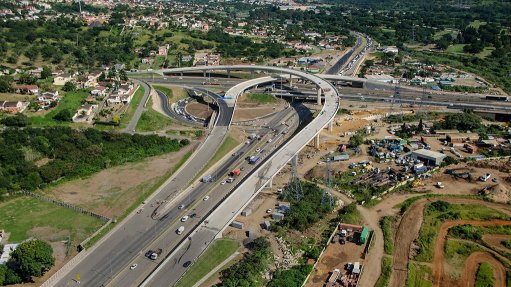
SANRAL is acclaimed as “a world-class road agency” that dramatically improved the management of the country’s national road network, a new study released by the World Bank reveals.
Its asset management approach has transformed the management of the national road network and led to a gradual transformation of the road construction and maintenance industry.
The World Bank publication, “Making It Happen” analyses selected case studies of institutional reforms in South Africa since 1994 and singles out SANRAL as a particular success story. It also states its preference for e-tolling, rather than increases to the fuel levy, to fund freeway construction projects.
Written by the World Bank’s lead transport specialist, Ben Gericke, the study tracks the performance of SANRAL since its establishment by President Nelson Mandela in 1998 to its current role to manage a national and provincial road network of 21 490 kilometres.
It highlights the fact that 95% of the roads managed by SANRAL are in “good to very good condition” and that 100% of the network is under routine maintenance contracts.
“These success factors made SANRAL the preferred road network manager in South Africa,” the study concludes.
The World Bank highlights four critical factors that contributed to SANRAL’s success:
- The political commitment to reform is strong with the recognition by Government that transport is an important pillar to grow the South African economy, expand trade and investment and achieve social cohesion.
- There is a strong leadership and continuity provided by the team under the Chief Executive Officer, Nazir Alli, who has been at the helm of SANRAL since its inception. Its human resource policies “foster morale within the agency and promote staff retention.”
- SANRAL adopted a more business-like approach to manage roads and introduced a pavement asset management framework and a staffing structure that responded to the requirements.
- SANRAL succeeded in attracting private sector participation in its expanding toll road operations.
“Road users accepted this principle until the politically driven opposition to the e-toll system of the Gauteng Freeway Improvement Project (GFIP) started,” the World Bank notes.
The study refers extensively to the available alternatives to fund freeway development projects in South Africa and concludes that an earmarked fuel levy “would at best be a proxy charge for road use” and would need to be adapted over time to take account of changes in vehicle technology.
“Tolling may be fairer to the poor than a fuel levy,” the World Bank states. The technology exists to charge each vehicle per kilometre of road used but implementation of such a system requires careful thought, given privacy concerns.
The study examines the public debate about e-tolling and states that opposition among road users should be addressed before South Africa embarks on other toll road projects.
It notes the recent decisions by provincial governments to transfer responsibility for the management of roads to SANRAL and says it would help realise Government’s vision to include all rural communities – especially previously disadvantaged ones – in the economy.
The World Bank concludes that land issues must be addressed in South Africa to shorten travel times of commuters and reduce the cost of transport for poorer people.
“SANRAL has an integral role to play in South Africa’s adaptation to rising traffic volumes, urbanisation, road congestion, growing long-distance trade and the movement of the people,” the study notes.
For the full report, see: https://openknowledge.worldbank.org/handle/10986/23739
Issued by Meropa Communications on behalf of SANRAL